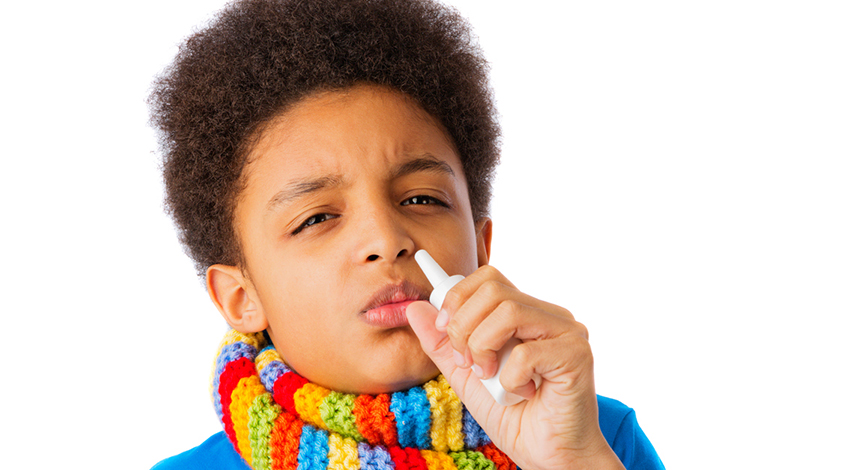
© sashahaltam/iStock
THIS ARTICLE IS MORE THAN FIVE YEARS OLD
This article is more than five years old. Autism research — and science in general — is constantly evolving, so older articles may contain information or theories that have been reevaluated since their original publication date.
Drugs that alter the activity of vasopressin, a hormone involved in social behavior, may improve social abilities in people with autism. Researchers presented these promising results from two clinical trials today at the 2017 International Meeting for Autism Research in San Francisco, California.
“I think this research has high potential, with continued investigation, to lead to the development of the first effective and personalized medication to treat the social features of autism,” says Karen Parker, assistant professor at Stanford University and lead investigator on one of the trials.
In Parker’s study, children with autism inhaled a nasal spray containing vasopressin, which boosts levels of the hormone in the body. In the other trial, men with autism took a drug that dampens the hormone’s activity in the brain.
People in both trials improved more on a test of social functioning than did those who got a placebo.
It’s a mystery how two treatments with opposite effects on vasopressin could both improve social abilities, says Bryan King, vice chair of child and adolescent psychiatry at the University of California, San Francisco, who was not involved in either study.
“It’s conceivable that there’s a subgroup of people for whom the approach is to improve function in the system, and a group that’s going to benefit from the other direction,” he says. Alternatively, the two treatments may alter social abilities through different mechanisms.
In any case, the findings are encouraging because no drugs are now available for the social difficulties seen in people with autism, a core feature of the condition. Both studies hint that the treatments are safe and effective.
Sniff test:
In Parker’s study, 15 children with autism were randomly selected to sniff vasopressin twice a day for four weeks. Another 13 children with the condition instead received a placebo spray that lacks the hormone. All of the children ranged in age from 6 to 12 years and have intelligence quotients of 50 or above.
Parker and her colleagues measured the children’s social abilities before and after treatment using the Social Responsiveness Scale (SRS), a questionnaire that parents complete. The researchers also measured blood levels of vasopressin as well as expression levels of genes encoding receptors for vasopressin and the related hormone oxytocin. They monitored the children weekly for side effects.
Children who received vasopressin improved by nearly 13 points, on average, on the SRS. Those who had the lowest vasopressin levels, the highest levels of the vasopressin receptor, or the lowest levels of the oxytocin receptor before treatment improved the most.
This finding suggests that blood tests would help researchers identify children for whom the treatment is most likely to work.
“We know that these drugs are not going to work in everyone, so I think the biomarker work has a lot of promise,” says Adam Guastella, professor of psychology at the Mind and Brain Centre in Sydney, Australia, who was not involved in the study.
Children who sniffed the placebo did not show any statistically significant improvement. The two groups did not differ in side effects, which were minor.
Drug test:
In the other study, 141 men with autism took a drug called RG7314, which blocks V1a, a brain receptor for vasopressin. Researchers led by Federico Bolognani at the Swiss drug company Roche tested three different doses of the drug: 30 men received pills containing 1.5 milligrams, 73 got 4 milligrams, and 38 got 10 milligrams. Another 72 men took a placebo pill.
All of the men, who have intelligence quotients above 70, took their assigned pills once a day for 12 weeks. Before and after treatment, caregivers rated the men’s social abilities on the SRS, the study’s primary outcome measure. The researchers also assessed the drug’s effects using a variety of secondary outcome measures, including the Vineland Adaptive Behavior Scales.
The drug seems to be safe, but none of the doses led to significant improvements in scores on the SRS. However, the intermediate and high doses significantly improved socialization and communication abilities as measured by the Vineland.
These doses boosted total scores on this test by about 4 or 5 points compared with controls. “These numbers are above the threshold for what we consider a minimum clinically important difference,” Bolognani says.
He and his colleagues are testing the same drug in children and teenagers with autism. For that study, they are using the Vineland as the primary outcome measure, instead of the SRS.
For more reports from the 2017 International Meeting for Autism Research, please click here.
By joining the discussion, you agree to our privacy policy.